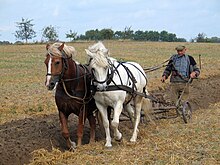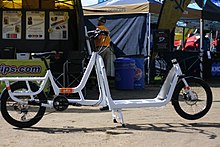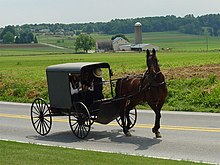Low technology

Low technology (low tech; adjective forms: low-technology, low-tech, lo-tech) is simple
History
Historical origin

In the 1970s
The
2000s and later

"Low-tech" has been more and more employed in the scientific writings, in particular in the analyzes of the work from some authors of the 1970s: see for example Hirsch ‐ Kreinsen,[7] the book "High tech, low tech, no tech" [3] or Gordon.[8]
More recently, the perspective of resource scarcity
Since 2007, the Belgian Kris de Decker has published (with his collaborators) some reflections on low-tech solutions, the problem of high-techs, and the updating of technologies supposedly "obsolete" via the "Low <-tech Magazine". The header is: "Doubts on progress and technology", and specifies that the lowtechs "refuse to assume that each problem has a high-tech solution",[10] with a progressive translation of the articles in other languages since recently.
In 2014, the french engineer Philippe Bihouix published "L'âge des low tech" (The age of low-techs) where he presents how a european nation like France, with little mineral and energy resources, could become a "low-tech" nation (instead of a "start-up" nation) to better correspond to the sustainable development goals of such nation.[11] He cites various examples of low-techs initiative and describe the low-tech philosophy and principles. In 2015, the Low-tech Lab project opened, consisting in a low-tech web platform for documentation and free sharing ('wiki' type) of inventions, and to put forward reflections on the low-tech philosophy.
Recently: retro-tech, wild tech, rebel-tech, small-tech, (s)low-tech, easy-tech, no-tech, lo-tek
Numerous new definitions have come to supplement or qualify the term "low-tech", intended to be more precise because they are restricted to a particular characteristic:
- retro-tech: more oriented toward old but smart inventions (not necessarily useful, durable and accessible), parallels can nevertheless be found with low-tech, because these innovations often are decentralized and simpler technologies (because manufactured by individuals) ".[12]
- Wild-tech: beyond the high-tech / low-tech opposition, it intends to give "tools to better think these ways of manufacturing which escape any classification".[13]The unclassifiable techs. Can also be linked to "tech rebel", a movement whose goal is to hack and to re-appropriate any type of technology.
- small-tech: opposed to "Big Tech", which includes the GAFAM. It thus referred to digital questions, "in the perspective of maintaining a high level of technological complexity but on the basis of the notions of commons, collaborative work and the principles of democracy and social justice"[14]
- (s)lowtech, or slow-tech: uses the lifestyle.[17]
- easy-tech: technology easy to implement, to use, and accessible to all.[18] At the heart of the commonly accepted definition of low-tech.
- no-tech: promotes a lifestyle avoiding the use of technology, when possible. It joins some technocritical writings on the negative and time-consuming aspect of most "modern" technologies. See for example no-tech magazine.[19]
- Lo-Tek (or LoTek): name introduced by Julia Watson for her book "The Power of Lo — TEK - A global exploration of nature-based technology".[20] The author brings together multigenerational knowledge and practices to "counter the idea that aboriginal innovation is primitive and exists isolated from technology. " TEK is the acronym for "Traditional Ecological Knowledge".
Many definitions
Binary definition
According to the Cambridge International Dictionary of English, the concept of low-tech is simply defined as a technique that is not recent, or using old
Also, with this definition, the "
Technocriticists
Low-tech is sometimes described as an "anti
Recently: a wider and more balanced approach
A second, more nuanced definition of low-tech may appear. This definition takes into account the
Contrary to the first definition, this one is much more
Furthermore, some reduce the definition of low-tech to meet basic needs (eating, drinking, housing, heating ...), which disqualifies many technologies from the definition of low-techs, but this definition does not is not always accepted.
Examples

From traditional practices (primary and secondary sectors)
Note: almost all of the entries in this section should be prefixed by the word traditional.

- basketry.
- hand coopering, and carpentry.
- the trade of the ship-wright.
- the trade of the wheel-wright.
- the trade of the wainwright: making wagons. (the Latin word for a two-wheeled wagon is carpentum, the maker of which was a carpenter.)
(Wright is the
- smithingand metal-crafts.
- acoustic instruments.
- mathematics (particularly, pure mathematics)
- organic farming and animal husbandry (i.e.; agriculture as practiced by all American farmers prior to World War II).
- saw-mill.
- fulling, felting, drop spindle spinning, hand knitting, crochet, & similar textile preparation.
- the production of Colonial America.
- glass-blowing.
- various subskills of food preservation:
Note: home canning is a counter example of a low technology since some of the supplies needed to pursue this skill rely on a global trade network and an existing manufacturing infrastructure.[citation needed]
- the production of various alcoholic beverages:
- flint-knapping
- cathedrals, and root cellars.
Domestic or consumer


(Non exhaustive) list of low-tech in a westerner's everyday life:
- Getting around by bike, and repairing it with second-hand materials
- Using a cargo bike to carry loads (rather than a gasoline vehicle)
- Drying clothesline or on a drying rack
- Washing clothes by hand, or in a human-powered washing machine
- Cooling one's home with a air conditioners)
- Using a bell as door bell
- A freezer)
- Long-distance sailing boat (rather than by plane)
- A wicker bag or a Tote bag (rather than a plastic bag) to carry things
- matches)
- A hand drill, instead of an electric one
- Lighting with sunlight or candles
- Hemp textiles
- To water plants with drip irrigation
- Paper sheets for note-taking
- To clean with a broom (rather than a vacuum cleaner)
- To find one's GPS)

Philosophy
Among the thinkers opposed to modern technologies,
Differences between green-tech and low-tech
This section is empty. You can help by adding to it. (April 2020) |
Debate on the 'real' low-techs, and difference(s) with high tech
This section is empty. You can help by adding to it. (April 2020) |
Legal status of low-technology
By federal law in the United States, only those articles produced with little or no use of machinery or tools with complex mechanisms may be stamped with the designation "hand-wrought" or "hand-made". Lengthy court-battles are currently underway over the precise definition of the terms "organic" and "natural" as applied to
Groups associated with low-technology

- Arts and Crafts Movement, popularized by Gustav Stickleyin America around 1900.
- Bauhaus movement of Germany around the same time.
- Do-It-Yourself phenomenon arising in America following World War II.
- Back-to-the-land movement beginning in America during the 1960s.
- Luddites, whose activities date to the very beginning of the Industrial Revolution.
- Living history and open-air museums around the world, which strives to recreate bygone societies.
- Simple living adherents, such as the Amish and to a lesser extent some sects of the Mennonites, who specifically refuse some newer technologies to avoid undesirable effects on themselves or their societies.
- high-technologycounterpart.
See also
- Obsolescence
- Do it yourself
- Anti-consumerism
- Degrowth
- Simple living
- Embodied energy
- Intermediate technology– sometimes used to mean technology between low and high technology
- Pre-industrial society
Sources
- Falk, William W.; Lyson, Thomas A. (1988). High tech, low tech, no tech: recent industrial and occupational change in the South. SUNY Press. ISBN 9780887067297.
- De Decker, Kris (2012). Low-tech magazine (tome 1 and 2). Low-tech Magazine. ISBN 9781794711525.
- Watson, Julia (2020). Lo—TEK. Design by Radical Indigenism. Taschen. ISBN 978-3836578189.
- Peter Ginn (2019). Slow Tech: The Perfect Antidote to Today's Digital World. Haynes UK. ISBN 9781785216169.
References
- ^ Alexis Bernigaud. "Low-Tech is the new High-Tech". climateforesight.eu. Retrieved 2020-04-16.
- ISSN 2053-9517.
- ^ ISBN 9780887067297.
- ^ ISBN 978-0-06-199776-1..
- ^ Murray Bookchin (1971). Post-Scarcity Anarchism (PDF). Ramparts Press. p. 288.
- S2CID 151175845.
- S2CID 154429255.
- S2CID 145449806.
- ISBN 978-0-86571-598-1.
- ^ Kris de Decker. "Low-Tech Magazine". lowtechmagazine.com. Retrieved 2020-04-06.
- ^ ISBN 978-2-02-116072-7.
- ^ "Retrotech and Lowtech - How forgotten patents can shake the future". paleo-energetique.org. Retrieved 2020-11-16.
- ^ ISSN 0248-6016.
- ^ "Passerelle #21 - Low tech : face au tout-numérique, se réapproprier les technologies" (PDF) (in French). 2020. Retrieved 2020-04-06.
- ^ "SlowTech - It is about finding the OFF switch". Retrieved 2020-04-06.
- ^ "The Slow Tech Movement". 6 May 2014. Retrieved 2020-04-06.
- ISBN 9781785216169.
- ISBN 978-2-37671-022-6.
- ^ "No tech reader #7". Retrieved 2020-04-06.
- ISBN 978-3836578189.
- ^ "Low tech definition". Cambridge International Dictionnary. Retrieved 2018-04-01.
- General
